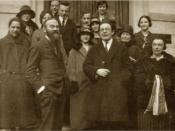In the first year of the infant's life they proceed through several stages. In the first month they have no idea that objects are permanent. The first to the fourth month infant's will stare at a spot where an object disappeared and then turn their attention to something else. The fourth to the eighth month infant's begin to show signs that an object exists although they cannot see it. The eighth to the twelfth month infant's develop the notation of object permanence. Studies indicate object permanence is related to later cognitive development suggesting that roots of cognitive lie in infancy. To discover how infants develop concepts such as object permanence we will examine the interpretation and the work of infancy of Jean Piaget.
Piaget stated that the period from birth to language achievement is marked by unusual mental growth and influences the entire course of development. Egocentrism describes the initial world of children.
Children see the world only from their point of view and everything centers on them. Young children lack social orientation and they speak at and not to each other. The egocentric child is unaware of any other viewpoint. The changes of the sensorimotor period occur within a sequence of six stages. During the first stage children do more than exercise the reflexes with which they are born. Piaget stated that the sucking reflex is hereditary and functions from birth. First infants sick anything that touches their lips they also suck when nothing is touching their lips then they actively search for the nipple. This process is known as the steady development of the coordination of arm, eye, hand, and mouth. Through these activities the baby is building a foundation for forming cognitive structures. Piaget referred to stage two from about one to four months as the...


